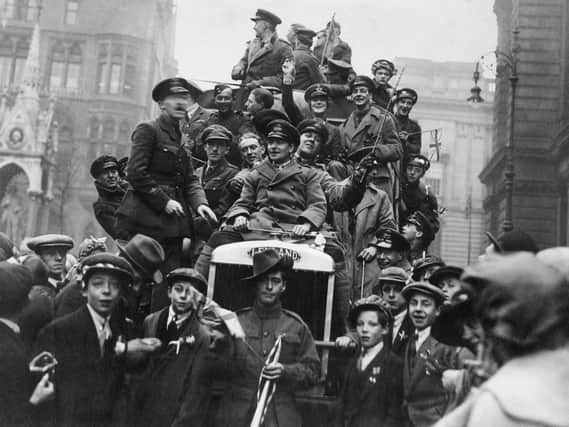Remembrance Day 2018: Lancashire's veterans faced battle for survival on the home front


They were promised “a land fit for heroes.”
But when thousands of battle-weary soldiers returned to their homes in the Preston area after the horrors of the trenches, they were greeted by something completely different.
Britain was a long way from being the welcoming haven which our victorious troops expected as their reward for four gruelling years of war.
Advertisement
Hide AdAdvertisement
Hide AdInstead they were confronted by unemployment, hunger and a desperate struggle against poverty. And the country was also in the grip of a devastating Spanish flu epidemic which killed more than 220,000.
While crowds lined the streets in unbridled celebration and the church bells rang out to greet the armistice, the returning warriors found out all too quickly they were facing another bitter battle for survival.
Almost three million men were demobilised within a year of the armistice. Most had no jobs to return to after four years of war.
And with many nursing appalling injuries from the battlefields - scars both physical and mental which most would never fully recover from - life would never be the same as it was in 1914.
Advertisement
Hide AdAdvertisement
Hide Ad“To be fair there wasn’t much to come back to,” said author David Huggonson who wrote the book Preston in the First World War.
“But it wasn’t just Preston, it was the same all over the country.
“It took a long time to get over the war. It was years before anything like normality returned.
“Society was disjointed, broken. People were no longer taking pride in things like they had before the war. It was a different place altogether than it had been in 1914.”
Advertisement
Hide AdAdvertisement
Hide AdMore than 2,300 servicemen did not make it home to Preston from the battlefields of France and Belgium.
But for those who did, the old place was a different town to the one they had left as excited volunteers off to do their bit for King and country.
So different, in fact, that many quickly began to doubt they had been the lucky ones. Indeed life for most would never be the same again.
Despite the celebrating crowds lining the streets, the Britain they returned to was both broken and broke.
Advertisement
Hide AdAdvertisement
Hide AdFrom being one of the world’s economic super-powers in 1914, the nation was now on its uppers, crippled by the borrowing it had taken on to fund the war effort.
Britain had been unprepared for the economic impact of a four-year conflict in which bullets alone had cost almost £4m a day.
Foreign trade had been damaged by the war and the country was heading into the deepest recession in history.
This was the grim picture that greeted the returning heroes as they stepped wearily off their trains at Preston Station.
Advertisement
Hide AdAdvertisement
Hide AdFor many there were no jobs to go back to and no prospect of things improving in the near future.
The picture for those who had been disabled in battle was even bleaker.
It is estimated that 41,000 British troops lost limbs in the First World War, 272,000 suffered other serious injuries to their legs or arms, 60,000 had been wounded in the head or eyes and 89,000 had seriously damaged their bodies in other ways.
Finding work when even the most able-bodied were struggling was tough.
Advertisement
Hide AdAdvertisement
Hide AdBut the scars weren’t only visible ones. Many more had suffered from shellshock in the trenches and, even though the conflict had now ended, the residual damage would remain with them for life.
Some of the returning troops displaced women from the “men’s” jobs they had been doing for four years on the home front, like munitions work at factories including Dick, Kerr’s on Strand Road, Preston. Women widowed in the war suddenly faced new levels of hardship trying to provide for their families.
Many of Lancashire’s soldiers and sailors did not get home to their loved ones until well into 1919 because of the scale of the demobilisation effort.
By then resentment had built and the survivors had grown to despise the politicians who had sent them away to die and seemed happy to forget them now they had returned.
Advertisement
Hide AdAdvertisement
Hide AdThere was little help with employment, housing, pensions and welfare, despite the promises made by the government that they would return to a land fit for heroes.
One soldier, Pte John McCauley from the 2nd Battalion of the Border Regiment, bemoaned the “sorry world” he and his comrades came back to.
He said: “What if those who died could come back and see what it was they fought for? I wonder what their thoughts would be.”
And in a plea to the nation he added: “Remember the dead – but also remember those who survived.”